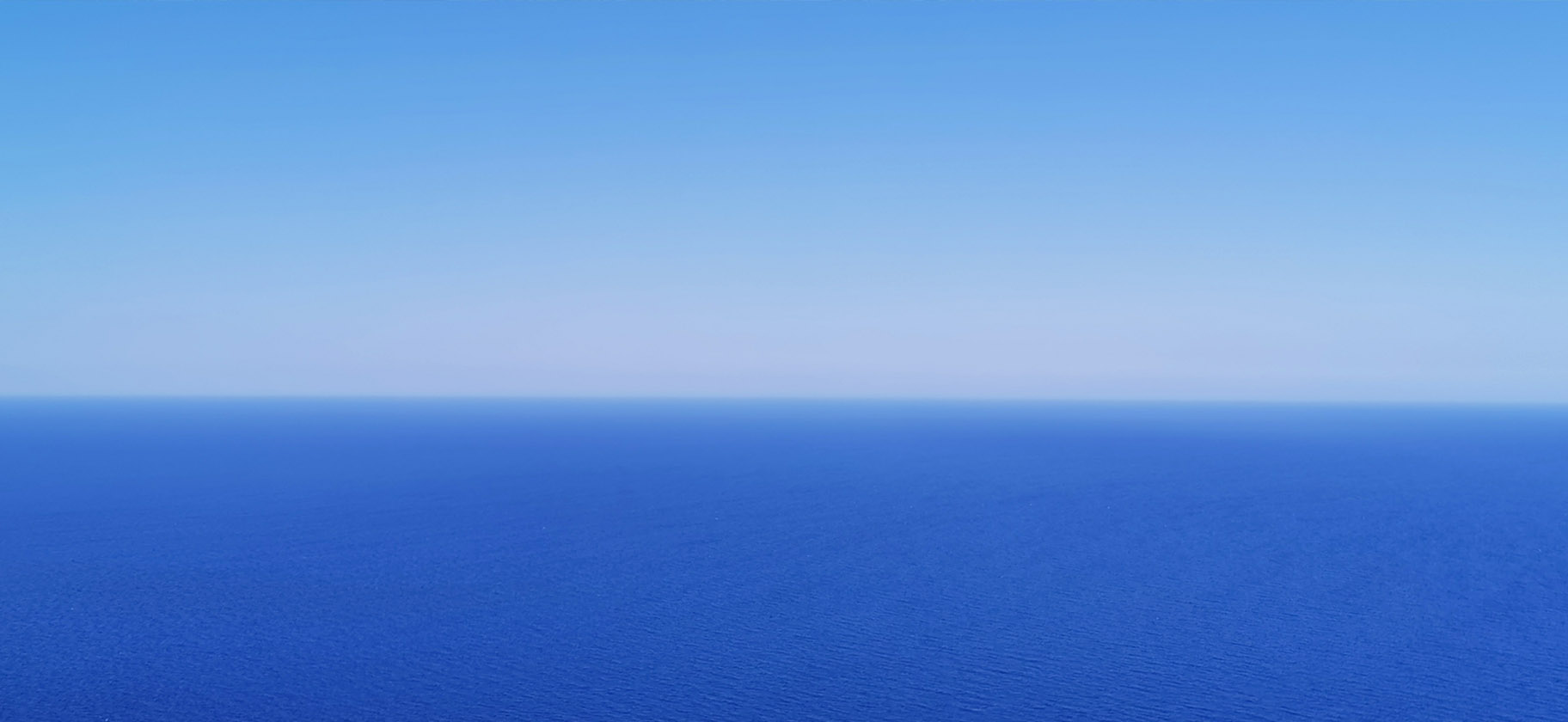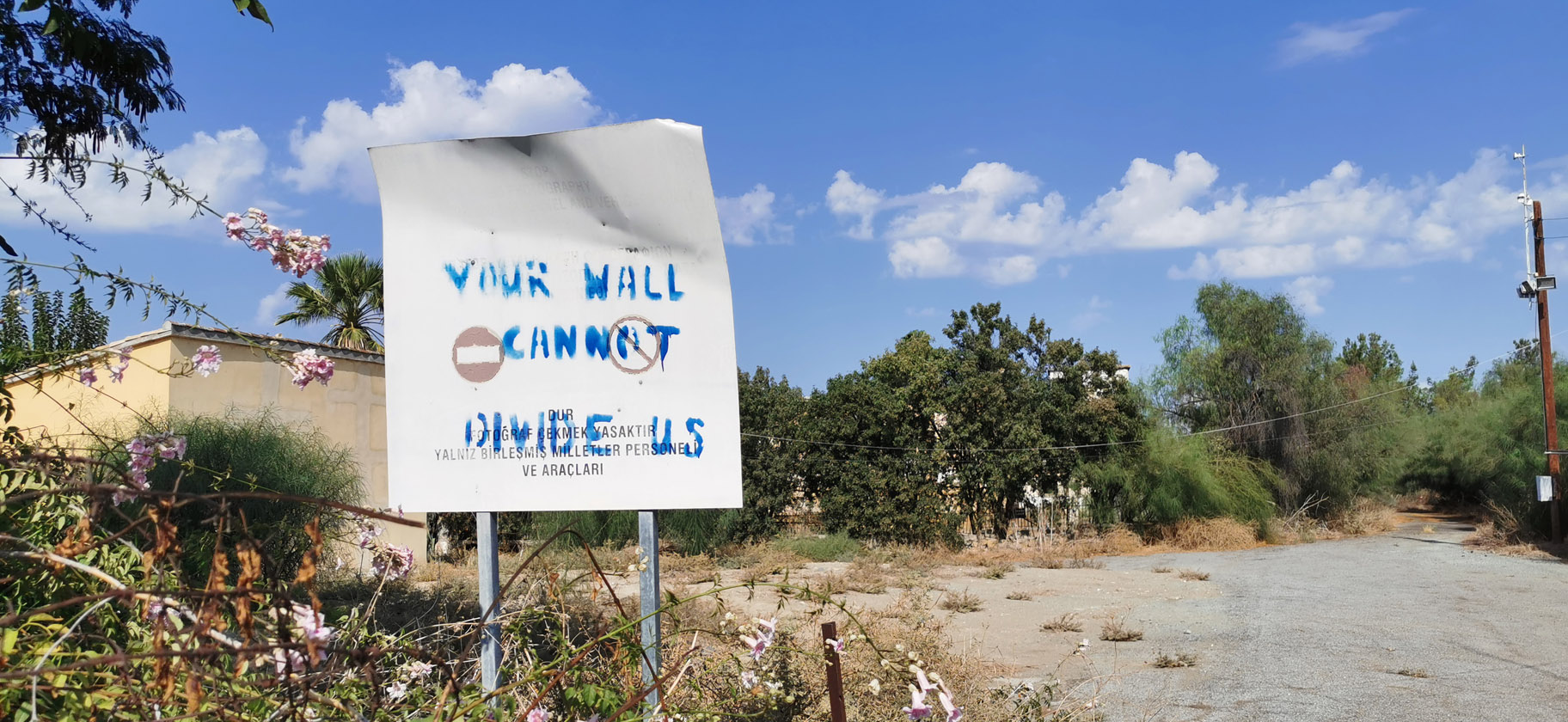The Green Line and Blue on Blue

Inland from the coast lies the capital city of Nicosia. Since the fall of the Berlin Wall, it is the only divided capital city in the world. One side of the city belongs to the Republic of Cyprus, while the other side belongs to the unrecognized state of the Turkish Republic of Northern Cyprus, and has been divided since 1974. For centuries, Greek and minority Turkish Cypriots had lived together in relative peace, but after a failed coup by pro-Hellenist nationalists hoping to unite Cyprus with Greece, the Turkish army invaded the northern part of the island nation to protect its minority Turkish population, and they have been there ever since. The city itself is divided by a UN buffer zone, called the Green Line, with a single checkpoint in the centre of town that unites the two sides. It has become a bit of a tourist site with obvious allusions to the Berlin wall. I decided to drive through one of the various checkpoints on the outskirts of the city and was required to purchase a 30-euro insurance policy for the car in order to continue to travel. I drove as far as Famagusta which turned out to be a quaint little walled town that resembled any other town on the Cypriot side.  The signs were in a different language, the currency switched to Turkish Lira, but the spirit, to my untrained senses, seemed the same and the sky and the sea were just as blue. I spent the day there and also ventured into North Nicosia to take in the view from the other side of the Green Line. There were statues of Ataturk in the parks and call to prayer ringing out loudly from the Mosque in the heart of the city, but life was essentially the same. Tourists ambled through the streets in groups and locals went about their day sipping coffee in the sun. Unlike in the early nineties with the fall of the Berlin wall, there did not seem to be any sense of families torn apart, or individuals trapped on one side yearning to be on the other. To my visiting eyes, it all seemed like symbolic bureaucracy and remnants of a conflict from a bygone era that had no real application in today’s world.
The signs were in a different language, the currency switched to Turkish Lira, but the spirit, to my untrained senses, seemed the same and the sky and the sea were just as blue. I spent the day there and also ventured into North Nicosia to take in the view from the other side of the Green Line. There were statues of Ataturk in the parks and call to prayer ringing out loudly from the Mosque in the heart of the city, but life was essentially the same. Tourists ambled through the streets in groups and locals went about their day sipping coffee in the sun. Unlike in the early nineties with the fall of the Berlin wall, there did not seem to be any sense of families torn apart, or individuals trapped on one side yearning to be on the other. To my visiting eyes, it all seemed like symbolic bureaucracy and remnants of a conflict from a bygone era that had no real application in today’s world.
Petros ran the guesthouse in Nicosia where I was staying near the Famagusta gate on the eastern edge of the Greek side of the old town. It was an old building with a large wooden door. Inside, the walls were covered with flags and hunting trophies, antique hunting gear, and pistols and helmets that he had collected over the years from his trips competing in clay pigeon shooting where he was an active member of a shooting club called Round Table. Deeper into the house there were more flags and trophies and an Orthodox shrine to Greek priests, prophets and saints. All of the furniture was old antiques made of thick wood, including an enormous hutch filled from top to bottom with wine and spirits which was strange since Petros said that he did not drink alcohol.
When I returned from my short trip up to the north side of the island I invited Petros to sit with me so that I could ask him what he thought about living in a divided city. Petros was in his mid-fifties, hairy all over but for the top of his head, and he sat at his table without a shirt and a cigarette dangling from his lips and taking slow deliberate puffs as the smoke danced around him in the fading light of the setting sun.
“You live in Canada, right?” he said. “And there are some French people there, correct? Well, imagine if all of a sudden France decided to invade your country and suddenly said, ‘ok, Canada is now France’. That would be crazy, right? You’d tell them to fuck off, but what can you do? This is what it was like for us. We are what, 1 million people? And then Turkey, 100 million people, and its enormous army, what are we supposed to do?”
“You would have been only about 10 years old when it was all happening so you would have memories about the conflict, but what about your daughter?” I asked as though leading him to confirm my suspicions about the Green Line.
“Oh, she doesn’t care about these things. She’s busy with Instagram and I don’t know what.”
When he said this I explained that what I had seen and experienced so far in Cyprus did not reflect a situation where there was conflict.
“YOU may not see any conflict out there,” he replied, “but there is still a conflict that we, living here, all carry in our hearts. My family used to have property up in the North near Kyrenia, but we can’t go there anymore. It was stolen from us. One day, poof, gone! My father can’t go there out of principle, it’s just too difficult for him. It’s too difficult for a lot of Cypriots because all we see is our sisters and our mothers being raped and our friends and family being executed in the streets. It’s not all just hotels and beaches to us, it’s the memory of the horror of the atrocities that happened here.”
His blunt account of the lingering animosity between the two sides sobered me up a bit and I realized that sometimes just because there are no bombs exploding in the streets that it does not mean that a war is not still going on – Petros was living proof of that. Whether the ideologies that sparked the conflict may have died down and the priorities of the newer generations are far removed from culture and religion, for those that lived through it, it is scar tissue that will never fully heal. Petros made a point of reminding me that though 45 years had passed that there was no love lost between the two sides, and for him, the line was drawn largely on religious grounds.
“Muslims,” he continued, “they’re always doing these crazy things. In the Greek Orthodox church, we have very strict rules against any kind of violence. This is why you never hear about any of these atrocities happening from us.”
Glancing at the television that was on in the other room and seeing images of the news showing Turkish troops invading Kurdish areas of Northwestern Syria I asked, “If the violence of the past is still felt in the hearts of the people, is there a fear that what happened 45 years ago could happen again?”
“There is always that fear. Let me show you something.”
He went into his bedroom where I could hear him rummaging for a moment. When he returned he was holding his rifle. It was the most fearsome thing I had seen in my life. It stood about three quarters as tall as he and had scopes and levers and looked like it was designed to intimidate. He explained that he was the lieutenant of a local militia that ran bi-weekly military training exercises. Should the events of 45 years ago repeat themselves, he would grab his rifle and his combat gear and without hesitation defend his family and his people. It was his duty to be ready for this eventuality.
“Is there someone just like you, a Turk, on the other side of the wall with a rifle who is also ready?” I asked.
“Of course,” he replied.
Earlier in the day, I wondered why this Green Line was still there, but that was based on an ignorance of why it was there in the first place and a lack of appreciation for how close the events that put that line there were to some people. But as time passes those atrocities become learned instead of lived and don’t elicit the same sense of dread in the next generation as in the generation that survived them. I asked Petros if he imagined a time when there would be no Green Line, when Christians and Muslims, Greek Cypriots and Turkish Cypriots, would live again in one undivided city and where the concerns that sparked the war would no longer be the concerns of those living there.
“This is the globalists’ agenda,” he said. “What they want to do is get rid of your religion and get rid of your culture and keep you concerned only with what’s on your telephone so that you no longer know who you really are. They believe that if they brainwash us into thinking that we’re all the same, and enough time passes, people will start to get along.”
“But are culture and religion, perhaps, sacrifices worth making if it brings a lasting peace?” I asked.
“People will always find something to fight about. We are wired to find differences. Whether it is us and the Turks today or someone else years from now, getting rid of religion and culture won’t change anything. And no, it’s not worth it.”
I thought I was clever and artful in noticing the subtle hues between the blue of the sea and the blue of the sky and that we were all a part of it; That the shades of each side were shared and symbiotic – the sea would not be so blue without the sky, and so the sky would not be so blue without the sea – but this is only the unobstructed view from the beach. Depending on where you look from, the sea and the sky can also be two vastly different worlds and sometimes there is a sharp Green Line between them.
